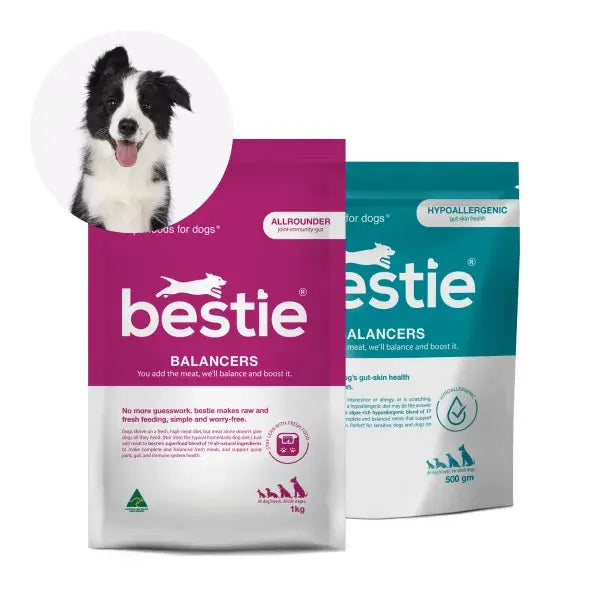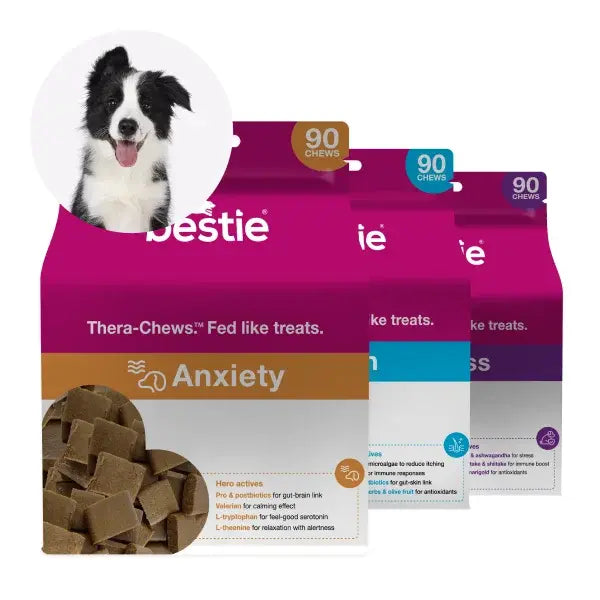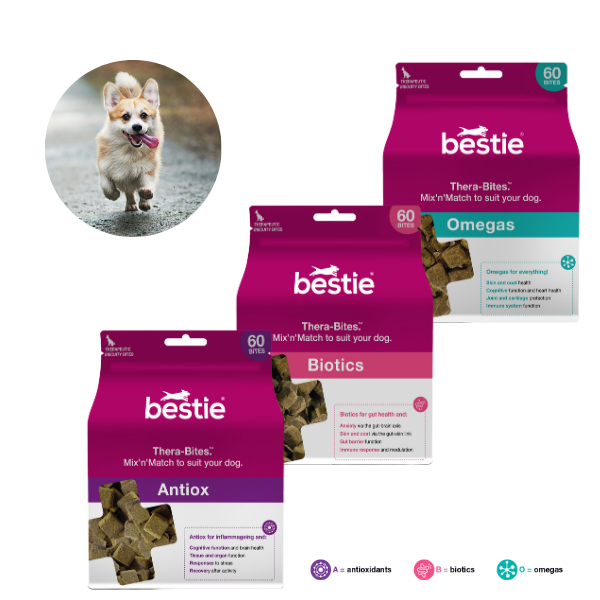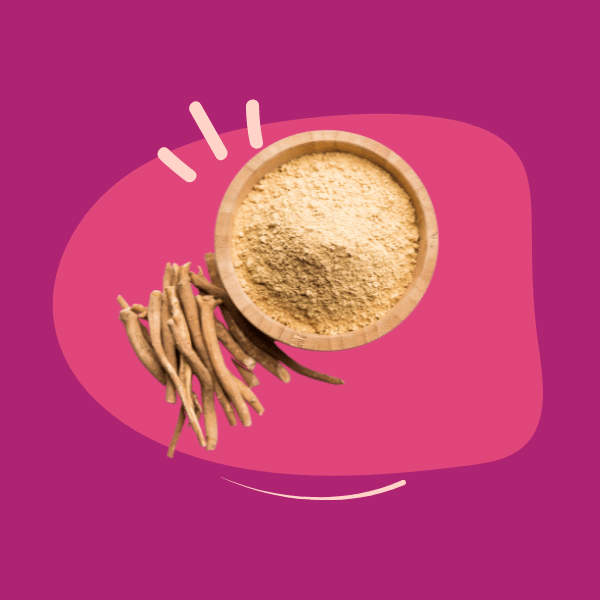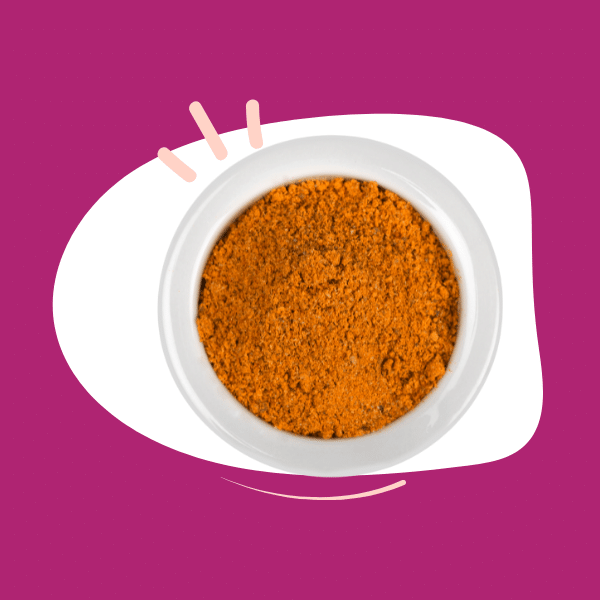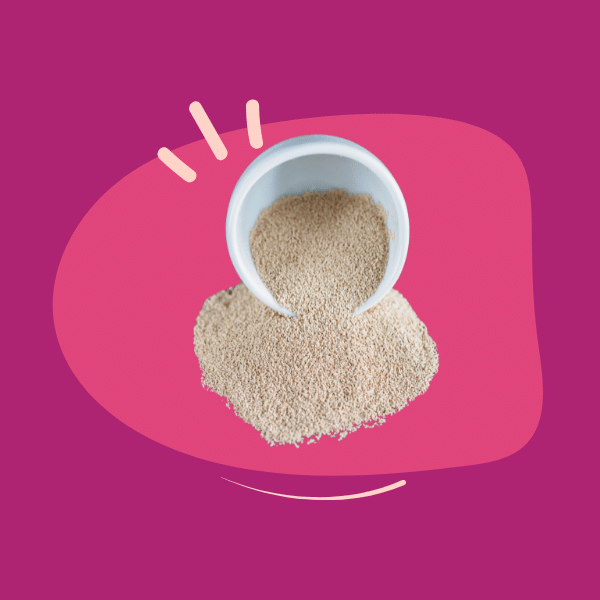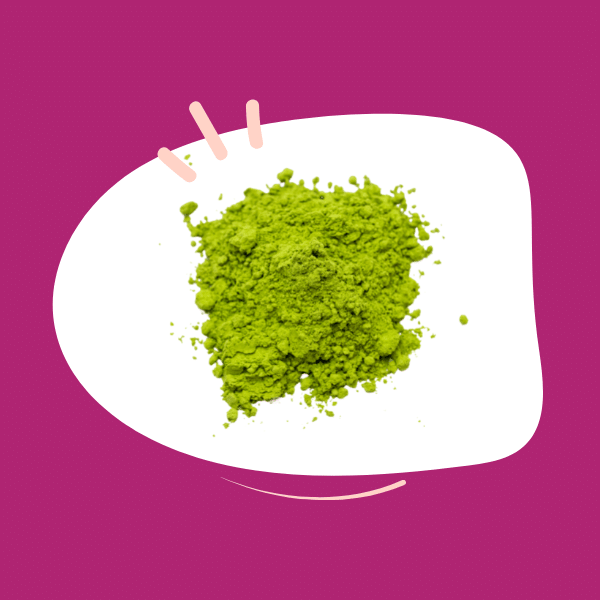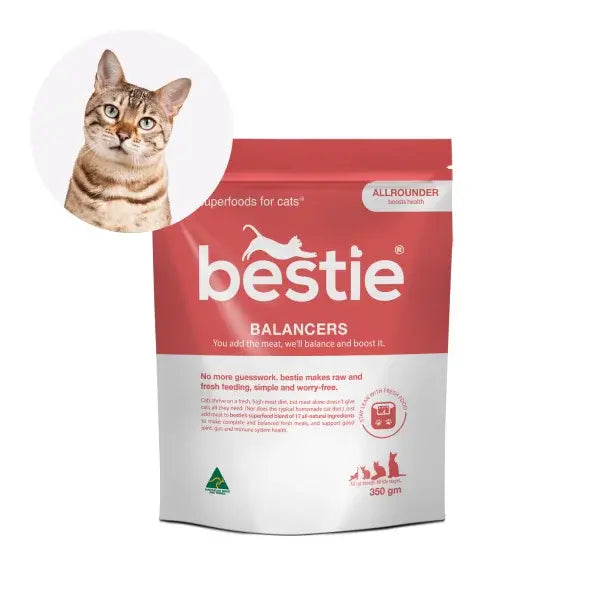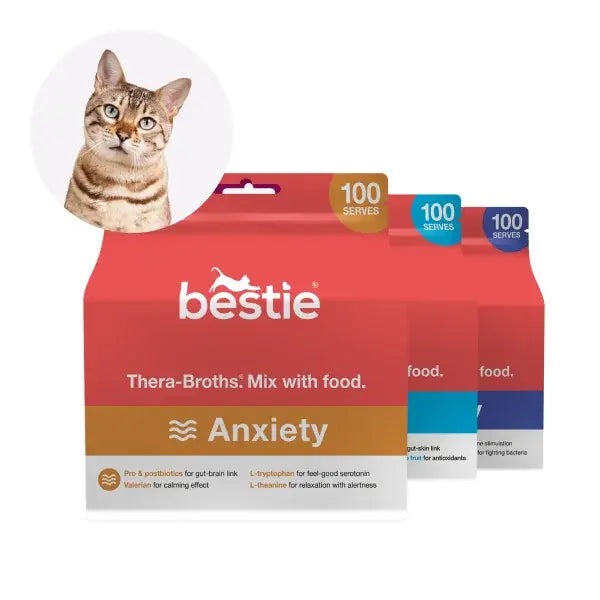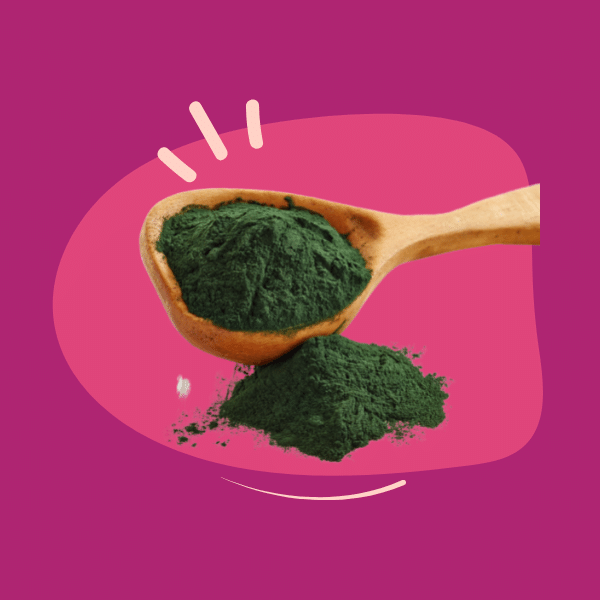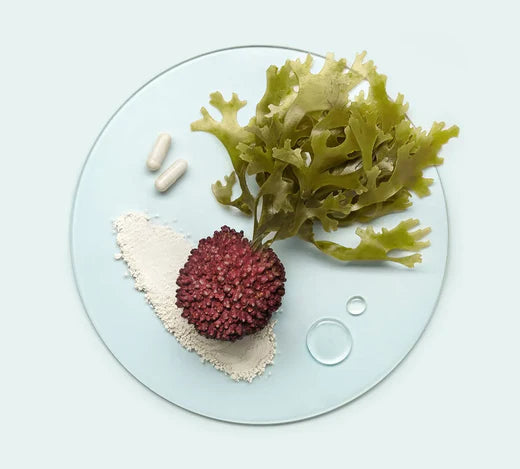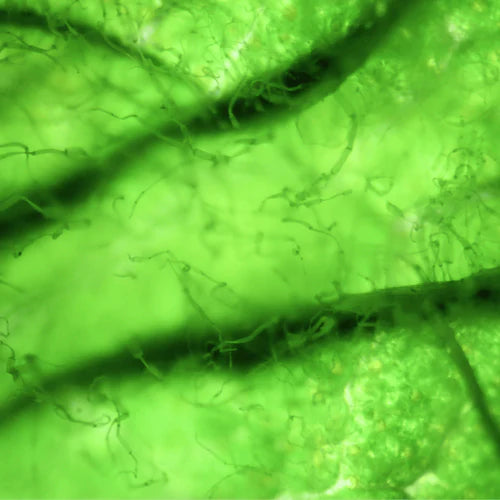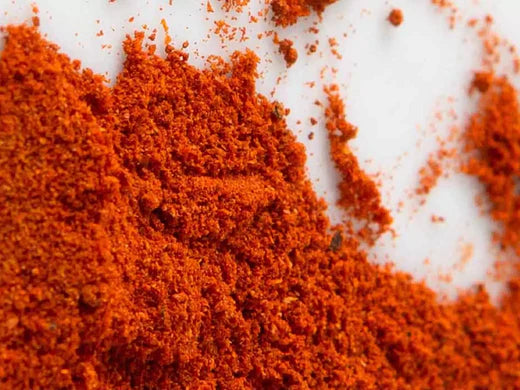There are a bunch of reasons we include algae-derived products and extracts in some of our formulations...here's why, in a nutshell.

Algae (micro-algae and macro-algae) are photosynthetic organisms considered natural reservoirs of compounds with bioactive properties, such as polysaccharides, vitamins, pigments, and polyunsaturated fatty acids (PUFA).1
From being a vital ingredient in algae-based cosmeceuticals and therapeutic formulas for skin diseases, these biologically active substances are now being studied extensively for their anti-inflammatory and antioxidant properties.
Algal polysaccharides are proving to be useful in the management of skin diseases associated with allergy flare-ups and chronic inflammation, like atopic dermatitis and allergies in dogs.
For example, the biologically active marine algal extracts in our Hypoallergenic Balancing pre-mix, strengthen innate and adaptive immune responses and enhance the barrier function of the intestinal mucosa. This helps to support the gut skin barrier.
Polysaccharides in algae extract
Polysaccharides are the main biologically active molecules that are found in algae. In some algal species, like E. prolifera, polysaccharides account for more than 50% of the dry weight making them the algae’s main chemical component. The major polysaccharides found in marine algae include fucoidan from brown algae, carrageenan from red algae, and ulvan from green algae.2
Collective scientific evidence shows the various biological activities of sulfated polysaccharides that include the following:
Polysaccharides boost intestinal integrity
The intestinal wall is a dynamic physical barrier which is the first line of defence against toxins and pathogens. There are two ways by which this defensive mechanism can be achieved.
The gut has a mucus layer that protects the intestinal mucosa, as well as a tight junction in between intestinal cells.
During times of stress or illness, the mucous layer decreases and there is weakening of the tight junctions. When the gut integrity is impaired, there is an increase in permeability as well as vulnerability to pathogens and toxins. Their abundant presence in the body tissues can overwhelm the immune system and compromise immune function.
Polysaccharides reinforce the junction between intestinal cells leading to a less permeable intestinal wall. They can also help increase mucin secretion of the goblet cells leading to a more functional mucus layer.
Polysaccharides modulate immune system function
Algal polysaccharides are biological immuno-modulators. These natural compounds can help initiate the body’s immune response by interacting with cell membrane receptors. This interaction can lead to the synthesis of immune mediators that can neutralises pathogens.
Polysaccharides participate in various immune system functions to help limit inflammation and control immune reactions as well as stimulate a compromised immune system.
One of these functions is “recruiting” cells that are actively involved in the immune response such as macrophages and neutrophils.
Another example is fucoidans from brown algae which can activate the immune defence system and inhibit the development of tumour cells by enhancing immunomodulatory activity.5
Modulation of the gut microbiota
The relationship between diet and nutrition on the gut microflora is well established. Scientific studies show that the microbial population in the gut is capable of digesting and utilising fibres such as polysaccharides, which the animal host cannot utilise. Food ingredients that are not broken down by enzymes from the pancreas and intestines reach the colon where they undergo bacterial fermentation.
The end products of microbial digestion of fibres in the gut include short-chain fatty acids (SCFAs), such as butyrate, propionate, and acetate. These SCFAs play an important role in the energy metabolism of the body. Butyrate, in particular, enhances epithelial barrier function and decreases the permeability of the intestinal barrier.3
Biodiversity in the gut microbiome
The biodiversity of micro-organisms in the body is essential because the microbiome has an important function in “educating” the immune system. Diversity is also needed to achieve tolerance. An imbalance or loss of biodiversity has been linked to the increased development of chronic inflammatory and allergic diseases.6
Loss of biodiversity due to lifestyle changes, whether dietary or environmental, promotes the development of an atopic state, which then promotes a chronic inflammatory response.7
Gut-skin axis
Both the skin and gut host various species of bacteria, viruses, and fungi that play important functions in maintaining homoeostasis (balance) within the body. Whenever this balance is disrupted, it may lead to an impairment in the barrier function of the skin and intestines.
The micro-organisms in the gut play a significant role in various skin disorders. Dysbiosis or a change in the balance of the microbial population in the gut can pave the way for many skin problems, like atopic dermatitis, dandruff, psoriasis, and even skin cancer, as well as an altered skin microbiome. Dysbiosis in the skin and/or gut is also associated with an altered immune response and inflammatory diseases.
When there is a change in the gut microbiome, there is also a consequent alteration in the skin microbiome. These changes can create a favourable environment for the development of many skin issues, such as atopic dermatitis, dandruff, and even skin cancer.
Microbial fermentation in the gut
Polysaccharides from algae undergo microbial digestion and fermentation in the gut that produces ‘hormone-like compounds’ such as short-chain fatty acids (SCFAs); secondary bile acids; cortisol; and neurotransmitters such as gamma-aminobutyric acid (GABA), serotonin, dopamine, and tryptophan.
The quantity of SCFAs that enter the bloodstream depends on several factors including the dog’s:
- Fibre intake
- Rate of microbial fermentation in the gut
- Amount of SCFAs absorbed by the colon
These products of microbial fermentation in the gut might cross the intestinal barrier and enter the bloodstream that carries them to specific organs in the body, such as the skin, where they exert systemic effects.
All these compounds, which are derived from the gut, could all interact with skin receptors and could directly affect the skin or modify the skin’s commensal bacteria.9
Algal polysaccharides as prebiotics
Prebiotic compounds are mostly non-digestible, soluble, carbohydrates, but recent studies suggest that dietary phytochemicals could also display prebiotic properties.4
Algal polysaccharides exert a prebiotic effect in dogs by promoting SCFA production and modulating the composition and/or diversity of gut microbiota. They help increase the population of good bacteria while preventing the accumulation of putrefactive compounds and bad bacteria in the gut.
Gut microbiota also has a significant role in maintaining homoeostasis (balance) and health of the dog by having direct involvement in the following:
- Gut structure and morphology
- Regulation of immune responses
- Protection from bad bacteria (pathogens) that may colonize the intestine
In addition to the above-mentioned benefits, algal polysaccharides also possess several nutraceutical effects including anti-diabetic, anticoagulant, anticancer, anti-tumour, antioxidant, anti-allergic, anti-inflammatory, hyperglycaemic, anti-obesity, antimicrobial, anti-fungal, and antiviral activities.8
Biologically active marine algal extract is a key ingredient in Bestie’s Hypoallergenic balancing pre-mix. The formula is perfect for dogs suffering from persistent scratching, rubbing, and licking brought about by food intolerance, allergies, and even atopic dermatitis.
It's also in our health chew Bestie Skin. It uses postbiotics, Chinese herbs, and the Algimun algal extracts in a highly therapeutic, soft mini chew to work on the gut-skin connection, and improve skin health.
Dr. Merliza Cabriles, DVM

Dr. Merliza Cabriles is a Licensed Veterinarianand a University Professor with many years of experience in food animal and pet companion medicine. Her passion for writing and pet parent education and support are echoed in the articles she has written for various websites in the pet niche, including bestie’s! She enjoys cultivating positive relationships with her clients and dedicates her time to educating and supporting pet parents in providing the best care for their pets.In her spare time, she enjoys trekking and traveling.
List of References:
- Menaa, F.; Wijesinghe, U.; Thiripuranathar, G.; Althobaiti, N.A.; Albalawi, A.E.; Khan, B.A.; Menaa, B. Marine Algae-Derived Bioactive Compounds: A New Wave of Nanodrugs? Drugs 2021, 19, 484.
- M.A.C. Udayangani,G.D.P. Somasiri,Indira Wickramasinghe,Se-Kwon Kim. Potential Health Benefits of Sulfated Polysaccharides from Marine Algae. 11 August 2020. https://doi.org/10.1002/9781119143802.ch22
- Mariadason J., Catto-Smith A., Gibson P. Modulation of distal colonic epithelial barrier function by dietary fibre in normal rats.1999;44:394–399. doi: 10.1136/gut.44.3.394.
- Martin Gotteland, Karla Riveros, Naschla Gasaly, Constanza Carcamo, Fabien Magne, Gianella Liabeuf, Alejandra Beattie, and Sebastián Rosenfeld. The Pros and Cons of Using Algal Polysaccharides as Prebiotics. Front. Nutr., 22 September 2020 Sec.Nutrition and Microbes. https://doi.org/10.3389/fnut.2020.00163
- Maruyama, H.; Tamauchib, H.; Iizuka, M.; Nakano, T. The role of NK cells in antitumor activity of dietary fucoidan from Undaria pinnatifida sporophylls (Mekabu). Planta Med. 2006, 72, 1415–1417.
- Salzman, N.H. The role of the microbiome in immune cell development. Allergy Asthma Immunol.2014, 113, 593–598.
- Haahtela, T.; Holgate, S.; Pawankar, R.; Akdis, C.A.; Benjaponpitak, S.; Caraballo, L.; Demain, J.; Portnoy, J.; von Hertzen, L. WAO Special Committee on Climate Change and Biodiversity. The biodiversity hypothesis and allergic disease: World allergy organization position statemenWorld Allergy Organ. J.2013, 6, 3.
- Faiez Hentati, Latifa Tounsi, Djomdi Djomdi, Guillaume Pierre, Cédric Delattre, Alina Violeta Ursu, Imen Fendri, Slim Abdelkafi, Philippe Michaud. Bioactive Polysaccharides from Seaweeds. MDPI, 2020, 25 (14), pp.3152. ff10.3390/molecules25143152ff. ffhal-03052385
- Britta De Pessemier, Lynda Grine, Melanie Debaere, Aglaya Maes, Bernhard Paetzoldand Chris Callewaert. Gut–Skin Axis: Current Knowledge of the Interrelationship between Microbial Dysbiosis and Skin Conditions. Journal List Microorganisms 9(2); 2021 Feb PMC7916842. doi: 10.3390/microorganisms9020353


